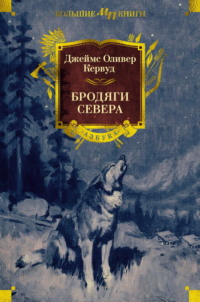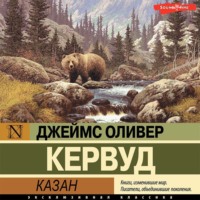
The Country Beyond: A Romance of the Wilderness
He sat up and stared wide-eyed at the dog. The fact that Peter had escaped from the cabin, and had followed him, was not altogether amazing. It was quite the natural thing for a one-man dog to do. But the unexpectedness of it held McKay speechless, and at first a little disappointed. It was as if Peter had deliberately betrayed a trust. During the storm and flight of the night McKay had thought of him as the one connecting link remaining between him and the girl he loved. He had left Peter to fill his place, to guard and watch and keep alive the memory of the man who was gone. For him there had been something of consolation in this giving up of his comradeship to Nada. And Peter had turned traitor.
Even Peter seemed to sense the argument and condemnation that was passing behind McKay's unsmiling eyes. He did not move, but lay squatted on his belly, with his nose straight out on the ground between his forepaws. It was his attitude of self-immolation. His acknowledgment of the other's right to strike with lash or club. Yet in his eyes, bright and steady behind his mop of whiskers, Jolly Roger saw a prayer.
Without a word he held out his arms. It was all Peter needed, and in a moment he was hugged up close against McKay. After all, there was a mighty something that reached from heart to heart of these two, and Jolly Roger said, with a sound that was half laugh and half sob in his throat,
"Pied-Bot, you devil – you little devil – "
His fingers closed in the cloth about Peter's neck, and his heart jumped when he saw what it was – a piece of Nada's dress. Peter, realizing that at last the importance of his mission was understood, waited in eager watchfulness while his master untied the knot. And in another moment, out in the clean and glorious sun that had followed storm, McKay held the shining tress of Nada's hair.
It was a real sob that broke in his throat now, and Peter saw him crush the shining thing to his face, and hold it there, while strange quivers ran through his strong shoulders, and a wetness that was not rain gathered in his eyes.
"God bless her!" he whispered. And then he said, "I wish I was a kid, Peter – a kid. Because – if I ever wanted to cry —it's now."
In his face, even with the tears and the strange quivering of his lips, Peter saw a radiance that was joy. And McKay stood up, and looked south, back over the trail he had followed through the blackness and storm of night. He was visioning things. He saw Nada in Father John's cabin, urging Peter out into the wild tumult of thunder and lightning with that precious part of her which she knew he would love forever. Her last message to him. Her last promise of love and faith until the end of time.
He guessed only the beginning of the truth. And Peter, denied the power of thought transmission because of an error in the creation of things, ran back a little way over the trail, trying to tell his master that Nada had come with him through the storm, and was back in the deep forest calling for him to return.
But McKay's mind saw nothing beyond the dimly lighted room of the Missioner's cabin.
He pressed his lips to the silken tress of Nada's hair, still damp with the rain; and after that, with the care of a miser he smoothed it out, and tied the end of the tress tightly with a string, and put it away in the soft buckskin wallet which he carried.
There was a new singing in his heart as he gathered sticks with which to build a small fire, for after this he would not travel quite alone.
That day they went on; and day followed day, until August came, and north – still farther north they went into the illimitable wilderness which reached out in the drowsing stillness of the Flying-up-Month – the month when newly fledged things take to their wings, and the deep forests lie asleep.
Days added themselves into weeks, until at last they were in the country of the Reindeer waterways.
To the east was Hudson's Bay; westward lay the black forests and twisting waterways of Upper Saskatchewan; and north – always north – beckoned the lonely plains and unmapped wildernesses of the Athabasca, the Slave and the Great Bear – toward which far country their trail was slowly but surely wending its way.
The woodlands and swamps were now empty of man. Cabin and shack and Indian tepee were lifeless, and waited in the desolation of abandonment. No smoke rose in the tree-tops; no howl of dog came with the early dawn and the setting sun; trap lines were over-growing, and laughter and song and the ring of the trapper's axe were gone, leaving behind a brooding silence that seemed to pulse and thrill like a great heart – the heart of the wild unchained for a space from its human bondage.
It was the vacation time – the midsummer carnival weeks of the wilderness people. Wild things were breeding. Fur was not good. Flesh was unfit to kill. And so they had disappeared, man, woman and child, and their dogs as well, to foregather at the Hudson's Bay Company's posts scattered here and there in the fastnesses of the wilderness lands. A few weeks more and they would return. Cabins would send up their smoke again. Brown-faced children would play about the tepee door. Ten thousand dwellers of the forests, white and half-breed and Indian born, would trickle in twos and threes and family groups back into the age-old trade of a domain that reached from Hudson's Bay to the western mountains and from the Height of Land to the Arctic Sea.
Until then nature was free, and in its freedom ran in riotous silence over the land. These were days when the wolf lay with her young, but did not howl; when the lynx yawned sleepily, and hunted but little – days of breeding, nights of drowsy whisperings, and of big red moons, and of streams rippling softly at lowest ebb while they dreamed of rains and flood-time. And through it all – through the lazy drone of insects, the rustling sighs of the tree-tops and the subdued notes of living things ran a low and tremulous whispering, as if nature had found for itself a new language in this temporary absence of man.
To Jolly Roger this was Life, It breathed for him out of the cool earth. He heard it over him, and under him, and on all sides of him where other ears would have found only a thing vast and oppressive and silent. On what he called these "motherhood days of the earth" the passing years had built his faith and his creed.
One evening he stopped for camp at the edge of the Burntwood. From his feet reached out the wide river, ankle deep in places, knee deep in others, rippling and singing between sandbars and driftwood where in May and June it had roared with the fury of flood Peter, half asleep after their day's travel through a hot forests watched his master. Since their flight from the edge of civilization far south he had grown heavier and broadened out. The hardship of adventuring and the craft of fighting for food and life had whipped the last of his puppyhood behind him At six months of age he was scarred, and lithe-muscled, and ready for instant action at all times. Through the mop of Airedale whiskers that covered his face his bright eyes were ever alert, and always they watched the back-trail as he wondered why the slim, blue-eyed girl they both loved and missed so much did not come. And vaguely he wondered why it was that his master always went on and on, and never waited for her to catch up with them.
And Jolly Roger was changed. He was not the plump and rosy-faced wilderness freebooter who whistled and sang away down at Cragg's Ridge even when he knew the Law was at his heels. The steadiness of their flight had thinned him, and a graver look had settled in his face. But in his clear eyes was still the love of life – a thing even stronger than the grief which was eating at his heart as their trail reached steadily toward the Barren Lands.
In the sunset glow of this late afternoon Peter's watchful eyes saw his master draw forth their treasure.
It was something he had come to look for, and expect – once, twice, and sometimes half a dozen times between the rising and the setting of the sun. And at night, when they paused in their flight for the day, Jolly Roger never failed to do what he was doing now. Peter drew nearer to where his master was sitting with his back to the big rock, and his eyes glistened. Always he caught the sweet, illusive perfume of the girl when Jolly Roger drew out their preciously guarded package. He unwrapped it gently now, and in a moment held in his hands the tress of Nada's hair, the last of her they would ever possess or see. And Peter wondered again why they did not go back to where they had left the rest of the girl. Many times, seeing his restlessness and his yearning, Jolly Roger had tried to make him understand. And Peter tried to comprehend. But always in his dreams he was with the girl he loved, following her, playing with her, fighting for her, hearing her voice – feeling the touch of her hand. In his dog soul he wanted her, just as Jolly Roger wanted her with all the yearning and heartbreak of the man. Yet always when he awoke from his dreams they went on again – not south – but north. To Peter this was hopeless mystery, and he possessed no power of reason to solve it. Nor could he speak in words the message which he carried in his heart – that last crying agony of the girl when she had sent him out on the trail of Roger McKay, entreating him to bring back the man she loved and would always love in spite of all the broken and unbroken laws in the world.
That night, as they lay beside the Burntwood, Peter heard his master crying out Nada's name in his sleep.
And the next dawn they went on – still farther north.
In these days and weeks, with the hot inundation of the wilderness about him, McKay fought doggedly against the forces which were struggling to break down the first law of his creed. The law might catch him, and probably would, and when it caught him the law might hang him – and probably would. But it would never know him. There was something grimly and tragically humorous in this. It would never know of the consuming purity of his worship for little children, and old people – and women. It would laugh at the religion he had built up for himself, and it would cackle tauntingly if he dared to say he was not wholly bad. For it believed he was bad, and it believed he had killed Jed Hawkins, and he knew that seven hundred men were anxious to get him, dead or alive.
But was he bad?
He took the matter up one evening, with Peter.
"If I'm bad, mebby it isn't all my fault, Pied-Bot," he said. "Mebby it's this – " and he swept his arms out to the gathering night. "I was born in the open, on a night just like this is going to be. My mother, before she died, told me many times how she watched the moon come up that night, and how it seemed to look down on her, and talk to her, like a living thing. And I've loved the moon ever since, and the sun, and everything that's outdoors – and if there's a God I don't believe He ever intended man to make a law that wasn't right according to the plans He laid out. That's where I've got in wrong, Pied-Bot, I haven't always believed in man-made law, and I've settled a lot of things in my own way. And I guess I've loved trees and flowers and sunshine and wind and storm too much. I've just wandered. And I've done things along the way. The thrill of it got into me, Pied-Bot, and – the law wants me!"
Peter heard the subdued humor of the man, a low laugh that held neither fear nor regret.
"It was the Treaty Money first," he went on, leaning very seriously toward Peter, as if he expected an argument. "You see, Yellow Bird was in that particular tribe, Pied-Bot. I remember her as she looked to me when a boy, with her two long, shining black braids and her face that was almost as beautiful to me as my mother's. My mother loved her, and she loved my mother, and I loved Yellow Bird, just as a child loves a fairy. And always Yellow Bird has been my fairy, Peter. I guess child worship is the one thing that lasts through life, always remaining ideal, and never forgotten. Years after my mother's death, when I was a young man, and had been down to Montreal and Ottawa and Quebec, I went back to Yellow Bird's tribe. And it was starving, Pied-Bot. Starving to death!"
Reminiscent tenderness and humor were gone from McKay's voice. It was hard and flinty.
"It was winter," he continued, "the dead of winter. And cold. So cold that even the wolves and foxes had buried themselves in. No fish that autumn, no game in the deep snows, and the Indians were starving. Pied-Bot, my heart went dead when I saw Yellow Bird. There didn't seem to be anything left of her but her eyes and her hair – those two great, shining braids, and eyes that were big and deep and dark, like beautiful pools. Boy, you never saw an Indian – an Indian like Yellow Bird – cry. They don't cry very much. But when that childhood fairy of mine first saw me she just stood there, swaying in her weakness, and the tears filled those big, wide-open eyes and ran down her thin cheeks. She had married Slim Buck. Two of their three children had died within a fortnight. Slim Buck was dying of hunger and exhaustion. And Yellow Bird's heart was broken, and her soul was crying out for God to let her lie down beside Slim Buck and die with him – when I happened along.
"Peter – " Jolly Roger leaned over in the thickening dusk, and his eyes gleamed. "Peter, if there's a God, an' He thinks I did wrong then, let Him strike me dead right here! I'm willin'. I found out what the trouble was. There was a new Indian Agent, a cur. And near the tribe was a Free Trader, another cur. The two got together. The Agent sent up the Treaty Money, and along with it – underground, mind you – he sent a lot of whiskey to the Free Trader. Inside of five days the whiskey got the Treaty Money from the Indians. Then came winter. Everything went bad, When I came – and found out what had happened – eighteen out of sixty had died, and inside of another two weeks half the others would follow. Pied-Bot, away back – somewhere – there must have been a pirate before me – mebby a great-grandfather of mine. I set out, I came back in three days, and I had a sledge-load of grub, and warm things to wear – plenty of them. My God, how those starving things did eat! I went again, and returned in another week, with a still bigger sledge-load. And Yellow Bird was getting beautiful again, and Slim Buck was on his feet, growing strong, and there was happiness – and I think God A'mighty was glad. I kept it up for two months. Then the back-bone of the winter broke. Game came into the country I left them well supplied – and skipped. That was what made me an outlaw, Pied-Bot. That!"
He chuckled, and Peter heard the rubbing of his hands in the gloom.
"Want to know why?" he asked. "Well, you see, I went over to the Free Trader's, and this God the law don't take into account went with me, and we found the skunk alone. First I licked him until he was almost dead. Then, sticking a knife into him about half an inch, I made him write a note saying he was called south suddenly, and authorizing me to take charge in his absence. Then I chained him in a dugout in a place where nobody would find him. And I took charge. Pied-Bot, I sure did! Everybody was on the trap-lines, and I wasn't bothered much by callers. And I fed and clothed my tribe for eight straight weeks, fed 'em until they grew fat, Boy – and Yellow Bird's eyes were bright as stars again. Then I brought Roach – that was his name – back to his empty post, and I lectured him, an' gave him another licking – and left."
McKay rose to his feet. The first stars were peeping out of the velvety darkness of the sky, and Peter heard his master draw in a deep breath – the breath of a man whose lungs rejoice in the glory of life.
After a moment he said,
"And the Royal Mounted have been after me ever since that winter, Peter. And the harder they've chased me the more I've given them reason to chase me. I half killed Beaudin, the Government mail-runner, because he insulted another man's wife when that man – my friend – was away. Then Beaudin, seeing his chance, robbed the mail himself, and the crime was laid to me. Well, I got even, and stuck up a mail-sledge myself – but I guess there was a good reason for it. I've done a lot of things since then, but I've done it all with my naked fists, and I've never put a bullet or a knife into a man except Roach the Free Trader. And the funniest thing of the whole business, Pied-Bot, is this – I didn't kill Jed Hawkins. Some day mebby I'll tell you about what happened on the trail, the thing which you and Nada didn't see. But now – "
For a moment he stood very still, and Peter sensed the sudden thrill that was going through the man as he stood there in darkness. And then, suddenly, Jolly Roger bent over him.
"Peter, there's three women we'll love as long as we live," he whispered. "There's my mother, and she is dead. There's Nada back there, and we'll never see her again – " His voice choked for an instant. "And then – there's Yellow Bird – " he added. "It's five years since I fed the tribe. Mebby they've had more kids! Boy, let's go and see!"
CHAPTER X
North and west, in the direction of Yellow Bird's people, went Jolly Roger and Peter after that night. They traveled slowly and cautiously, and with each day Peter came to understand more clearly there was some reason why they must be constantly on their guard. His master, he noticed, was thrillingly attentive whenever a sound came to their ears – perhaps the cracking of a twig, a mysterious movement of brush, or the tread of a cloven hoof. And instinctively he came to know they were evading Man. He remembered vividly their escape from Cassidy and their quiet hiding for many days in the mass of sun-baked rocks which Jolly Roger had called the Stew-Kettle. The same vigilance seemed to be a part of his master's movements now. He did not laugh, or sing, or whistle, or talk loudly. He built fires so small that at first Peter was absorbed in an almost scientific analysis of them; and instead of shooting game which could have been easily secured he set little snares in the evening, and caught fish in the streams. At night they always slept half a mile or more from the place where they had built their tiny supper-fire. And during these hours of sleep Peter was ready to rouse himself at the slightest sound of movement near them. Scarcely a night passed that his low growl of warning did not bring Jolly Roger out of his slumber, a hand on his gun, and his eyes and ears wide open.
Whether he would have used the gun had the red-coated police suddenly appeared, McKay had not quite assured himself. Day after day the same old fight went on within him. He analyzed his situation from every point of view, and always – no matter how he went about it – eventually found himself face to face with the same definite fact. If the law succeeded in catching Him it would not trouble itself to punish him for stealing back the Treaty Money, or for holding up Government mails, or for any of his other misdemeanors. It would hang him for the murder of Jed Hawkins. And the minions of the law would laugh at the truth, even if he told it – which he never would. More than once his imaginative genius had drawn up a picture of that impossible happening. For it was a truth so inconceivable that he found the absurdity of it a grimly humorous thing. Even Nada believed he had killed her scoundrelly foster-father. Yet it was she – herself – who had killed him! And it was Nada whom the law would hang, if the truth was known – and believed.
Frequently he went back over the scenes of that tragic night at Cragg's Ridge when all the happiness in the world seemed to be offering itself to him – the night when Nada was to go with him to the Missioner's, to become his wife, And then – the dark trail – the disheveled girl staggering to him through the starlight, and her sobbing story of how Jed Hawkins had tried to drag her through the forest to Mooney's cabin, and how – at last – she had saved herself by striking him down with a stick which she had caught up out of the darkness. Would the police believe HIM – an outlaw – if he told the rest of the story? – how he had gone back to give Jed Hawkins the beating of his life, and had found him dead in the trail, where Nada had struck him down? Would they believe him if, in a moment of cowardice, he told them that to protect the girl he loved he had fastened the responsibility of the crime upon himself? No, they would not. He had made the evidence too complete. The world would call him a lying yellow-back if he betrayed what had actually happened on the trail between Cragg's Ridge and Mooney's cabin.
And this, after all, was the one remaining bit of happiness in Jolly Roger's heart, the knowledge that he had made the evidence utterly complete, and that Nada would never know, and the world would never know – the truth. His love for the blue-eyed girl-woman who had given her heart and her soul into his keeping, even when she knew he was an outlaw, was an undying thing, like his love for the mother of years ago. "It will be easy to die for her," he told Peter, and this, in the end, was what he knew he was going to do. Thought of the inevitable did not make him afraid. He was determined to keep his freedom and his life as long as he could, but he was fatalistic enough, and sufficiently acquainted with the Royal Northwest Mounted Police, to know what the ultimate of the thing would be. And yet, with tragedy behind him, and a still grimmer tragedy ahead, the soul of Jolly Roger was not dead or in utter darkness. In it, waking and sleeping, he enshrined the girl who had been willing to give up all other things in the world for him, who had pleaded with him in the last hour of storm down on the edge of civilization that she be given the privilege of accompanying him wherever his fate might lead. That he was an outlaw had not destroyed her faith in him. That he had killed a man – a man unfit to live – had only drawn her arms more closely about him, and had made her more completely a part of him. And a thousand times the maddening thought possessed Jolly Roger – was he wrong, and not right, in refusing to accept the love and companionship which she had begged him to accept, in spite of all that had happened and all that might happen?
Day by day he slowly won for himself, and at last, as they traveled in the direction of Yellow Bird's country, he crushed the final doubt that oppressed him, and knew that he was right. In his selfishness he had not shackled her to an outlaw. He had left her free. Life and hope and other happiness were ahead of her. He had not destroyed her, and this thought would strengthen him and leave something of gladness in his heart, even in that gray dawn when the law would compel him to make his final sacrifice.
It is a strange peace which follows grief, a secret happiness no other soul but one can understand. Out of it excitement and passion have been burned, and it is then the Great God of things comes more closely into the possession of his own. And now, as they went westward and north toward the Wollaston Lake country, this peace possessed Jolly Roger. It mellowed his world. It was half an ache, half a steady and undying pain, but it drew Life nearer to him than he had ever known it before. His love for the sun and the sky, for the trees and flowers and all growing things of the earth was more worship of the divine than a love for physical things, and each day he felt it drawing more closely about him in its comradeship, whispering to him of its might, and of its power to care for him in the darkest hours of stress that might come.
He did not travel fast after he had reached the decision to go to Yellow Bird's people. And he tried to imagine, a great deal of the time, that Nada was with him. He succeeded in a way that bewildered Peter, for quite frequently the man talked to someone who was not there.
The slowness and caution with which they traveled developed Peter's mental faculties with marvelous swiftness. His master, free of egoism and prejudice, had placed him on a plane of intimate equality, and Peter struggled each day to live up a little more to the responsibility of this intimacy and confidence. Instinct, together with human training, taught him woodcraft until in many ways he was more clever than his master. And along with this Jolly Roger slowly but surely impressed upon him the difference between wanton slaughter and necessary killing.








